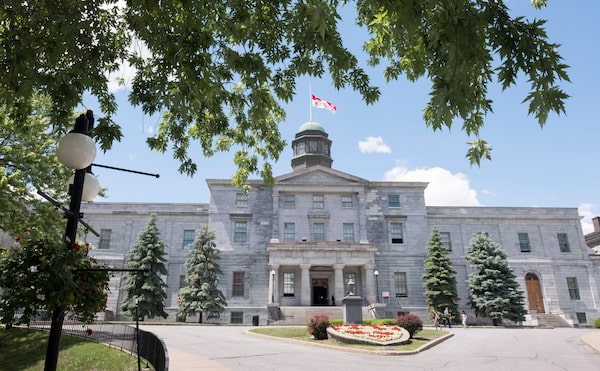
McGill University campus is seen June 21, 2016, in Montreal.Paul Chiasson/The Canadian Press
Quebec is nearly doubling university tuition fees for out-of-province anglophone students in the government’s latest effort to protect the French language, a move English-language institutions say could be financially disastrous for them.
Starting next year, fees for Canadians from other provinces will jump from just under $9,000 to around $17,000, Quebec Minister of Higher Education Pascale Déry announced at a news conference Friday.
“Quebeckers will no longer pay for the training of English-speaking Canadian students, most of whom return to their province after graduation,” Ms. Déry said in a statement. She said the current fees mean Quebec subsidizes out-of-province students’ education at a cost of more than $100-million per year.
The higher fees will be equivalent to the cost of their education, Ms. Déry said.
Globe readers share their thoughts on Quebec’s tuition hike for English-speaking students
The François Legault government has taken a number of steps in recent years in a bid to preserve the French language, most notably the passing of Bill 96 last year, which has had far-reaching implications in Quebec public life from education, to health care to the workplace.
Ms. Déry said Friday, however, that out-of-province students who want to study in a French-language university could be exempt from the tuition hikes, but those details have not yet been announced. Quebec also announced minimum tuition fees of $20,000 for international students, but universities will retain the right to charge additional discretionary fees.
Ms. Déry said the new fees would apply to undergraduate and professional graduate degrees but not to research-based graduate degrees, and would not affect international students who benefit from existing agreements on tuition fees, such as French and Belgian students.
She said the Quebec government would recover an undisclosed lump sum for each non-Quebec student as part of the new fees. The tuition hike and lump sums will amount to “at least $110-million” that will be used to “fund measures which will allow us to better support the French-speaking network in attracting international students, particularly in strategic areas for the Quebec economy and our public services,” Ms. Déry said.
Ms. Déry and the Quebec Minister of the French Language, Jean-François Roberge, said the new measures would balance the disproportionate funding from international students going to English-language institutions.
She said that between 2019 and 2022, McGill University, Concordia University, and Bishop’s University received about $282-million of the $407-million in additional revenues from international student tuition fees, meaning French-language institutions each got much less on average.
Concordia University president Graham Carr said there was no consultation between the province and the three anglophone universities on this policy. He said it will make Quebec universities less attractive to students in the rest of Canada, where tuition will be about half as much, and will almost certainly have a negative impact on enrolment and revenue.
“By doubling these tuition fees we risk losing an important part of the market and it will have serious financial consequences for the universities, and it will have very significant consequences in terms of the character and culture of our institutions,” Mr. Carr said.
He said at the moment Concordia keeps only about $3,000 on average of domestic student tuition, and that share will remain the same, with the government taking all the excess to redistribute among French-language institutions.
Deep Saini, principal and vice-chancellor of McGill University, said in a statement he was disappointed by the government’s decision and the consequences for the province.
“A thriving knowledge economy requires a global exchange of talent,” he said. “The measures announced today will have a major, long-term effect on Quebec’s economy.”